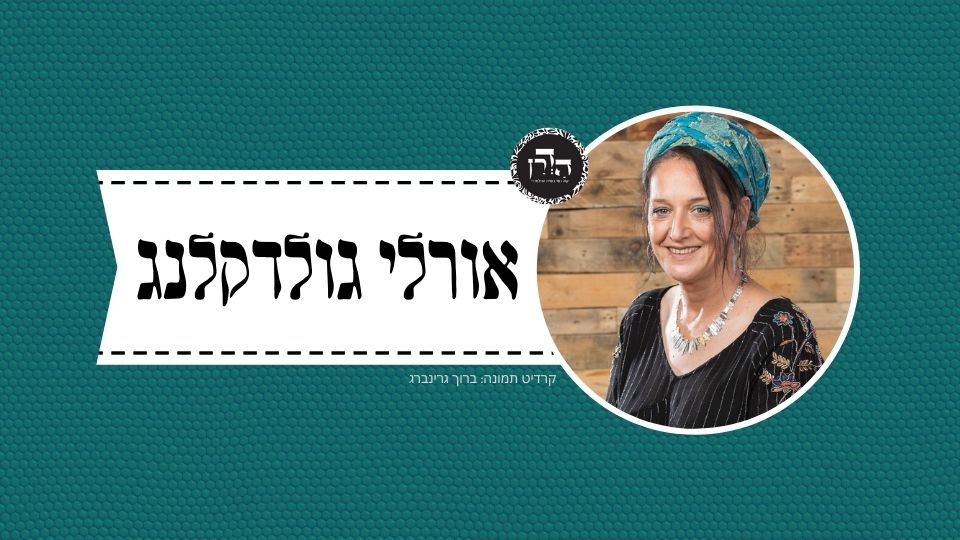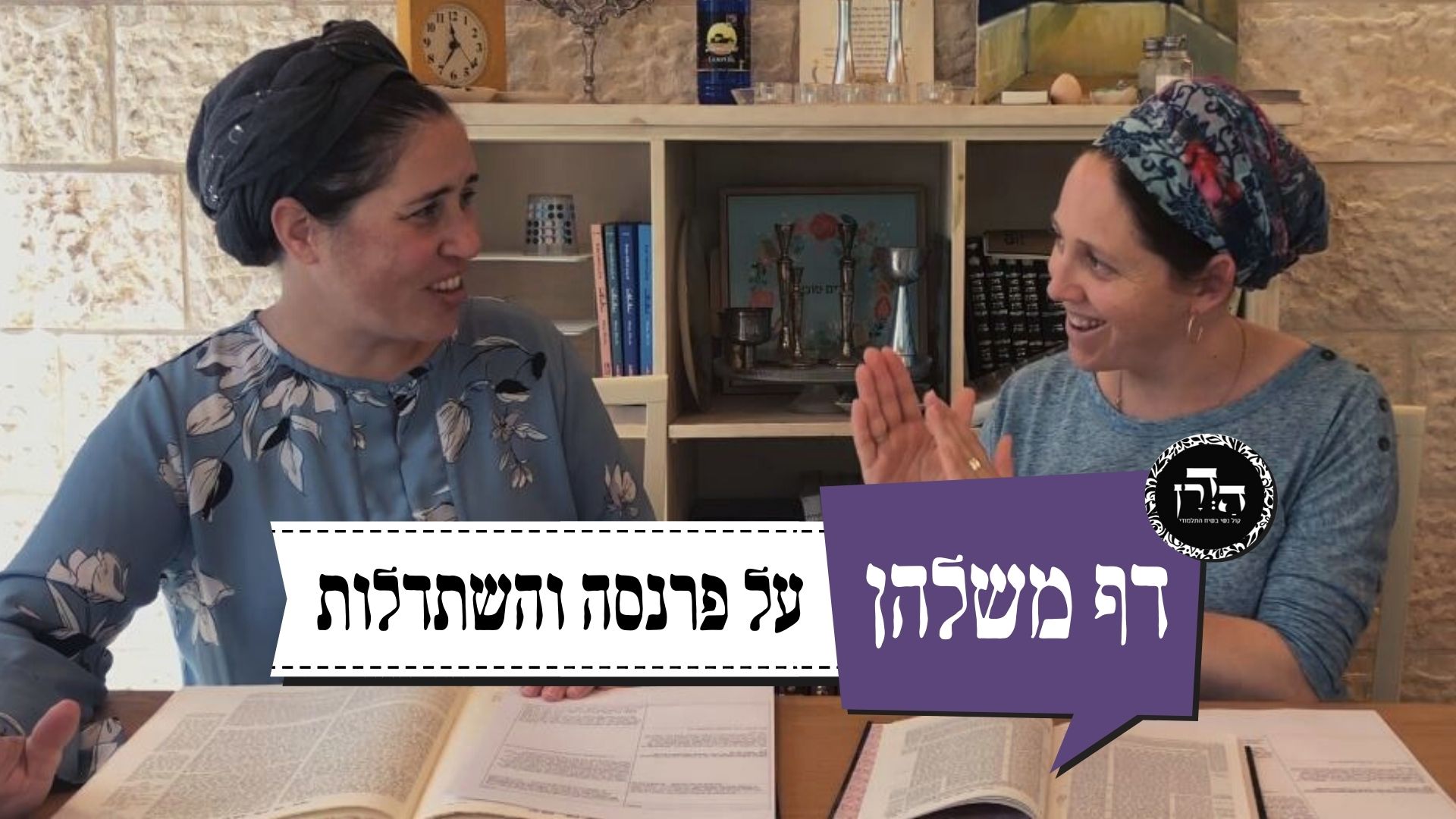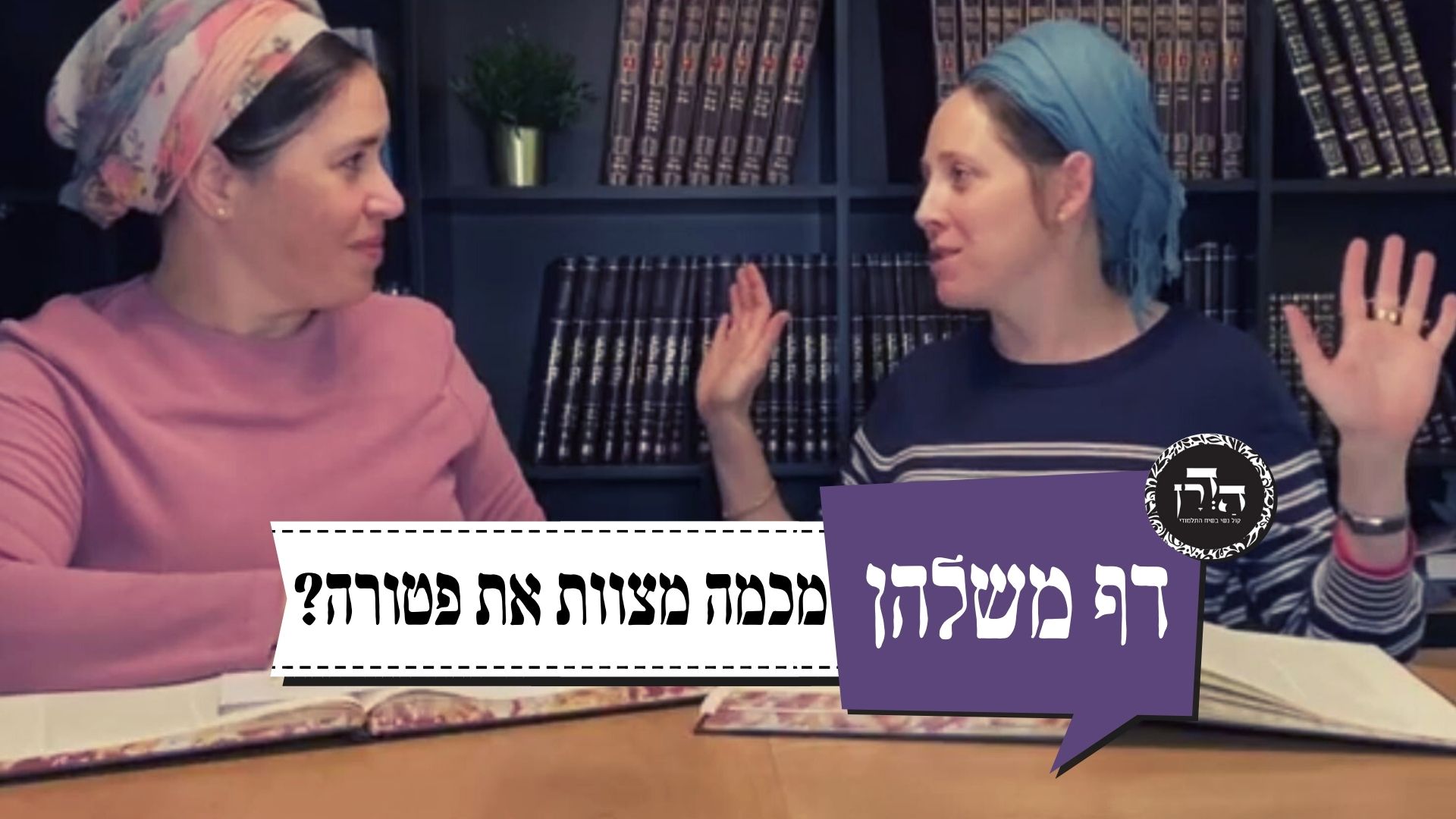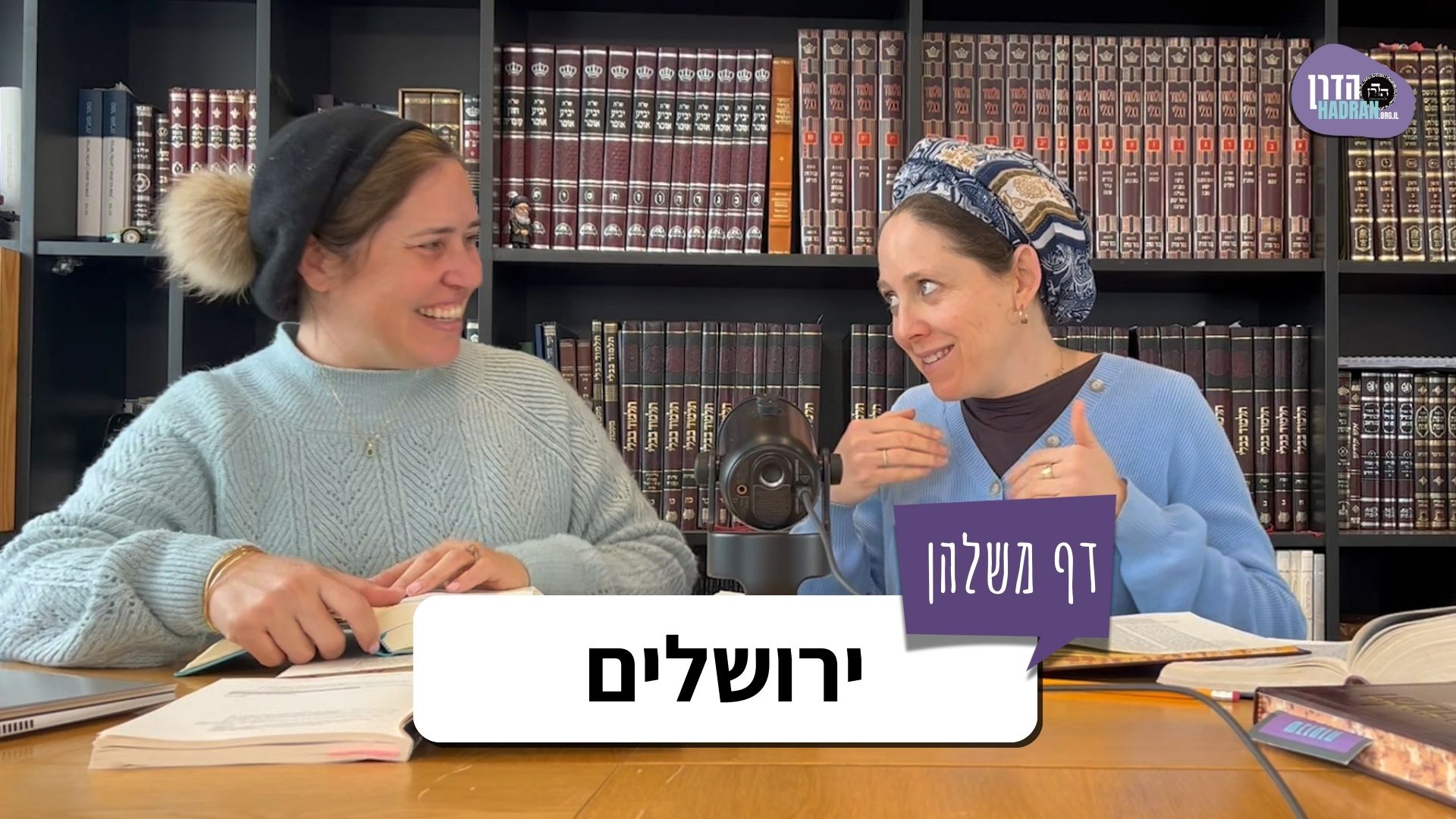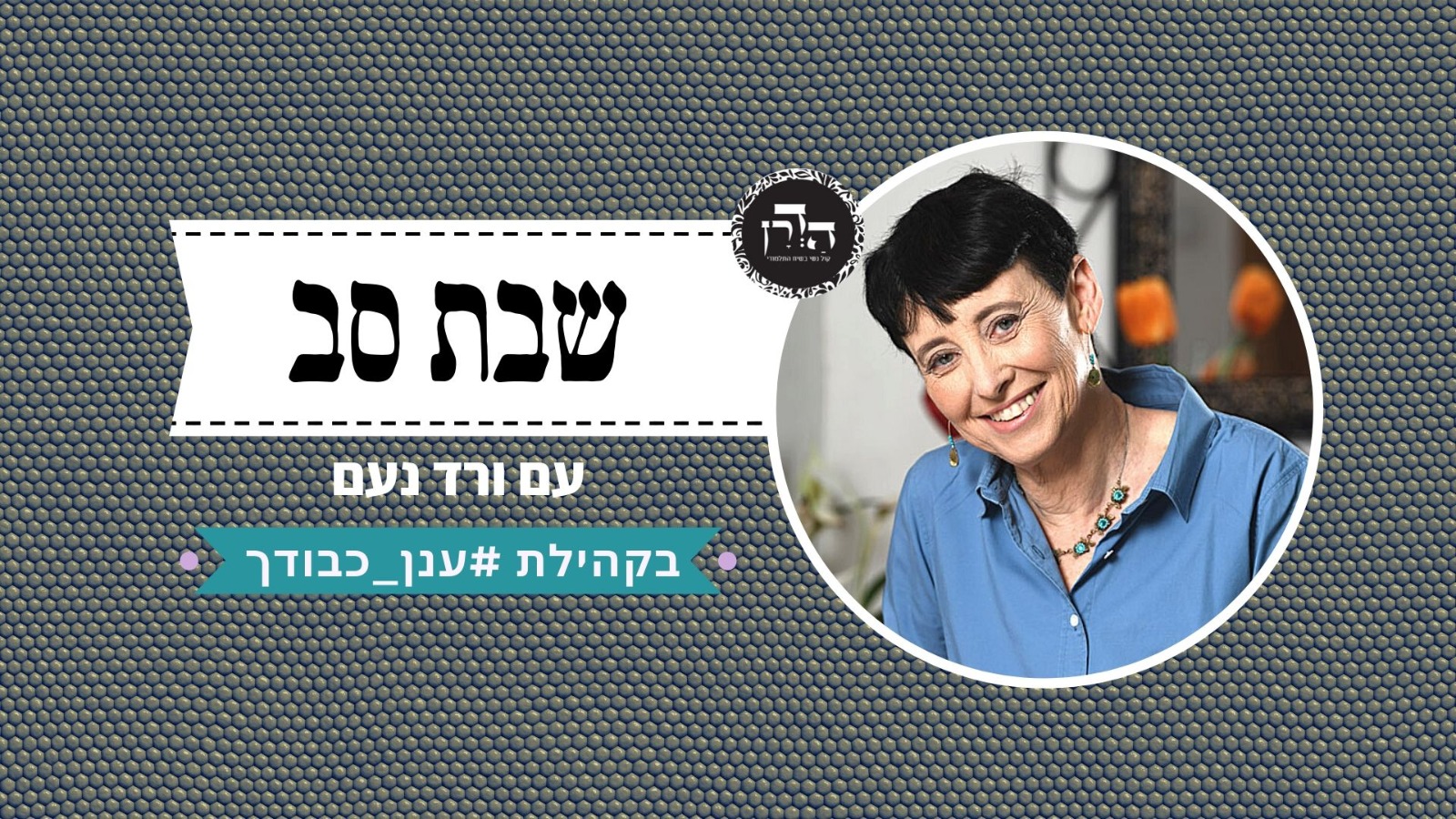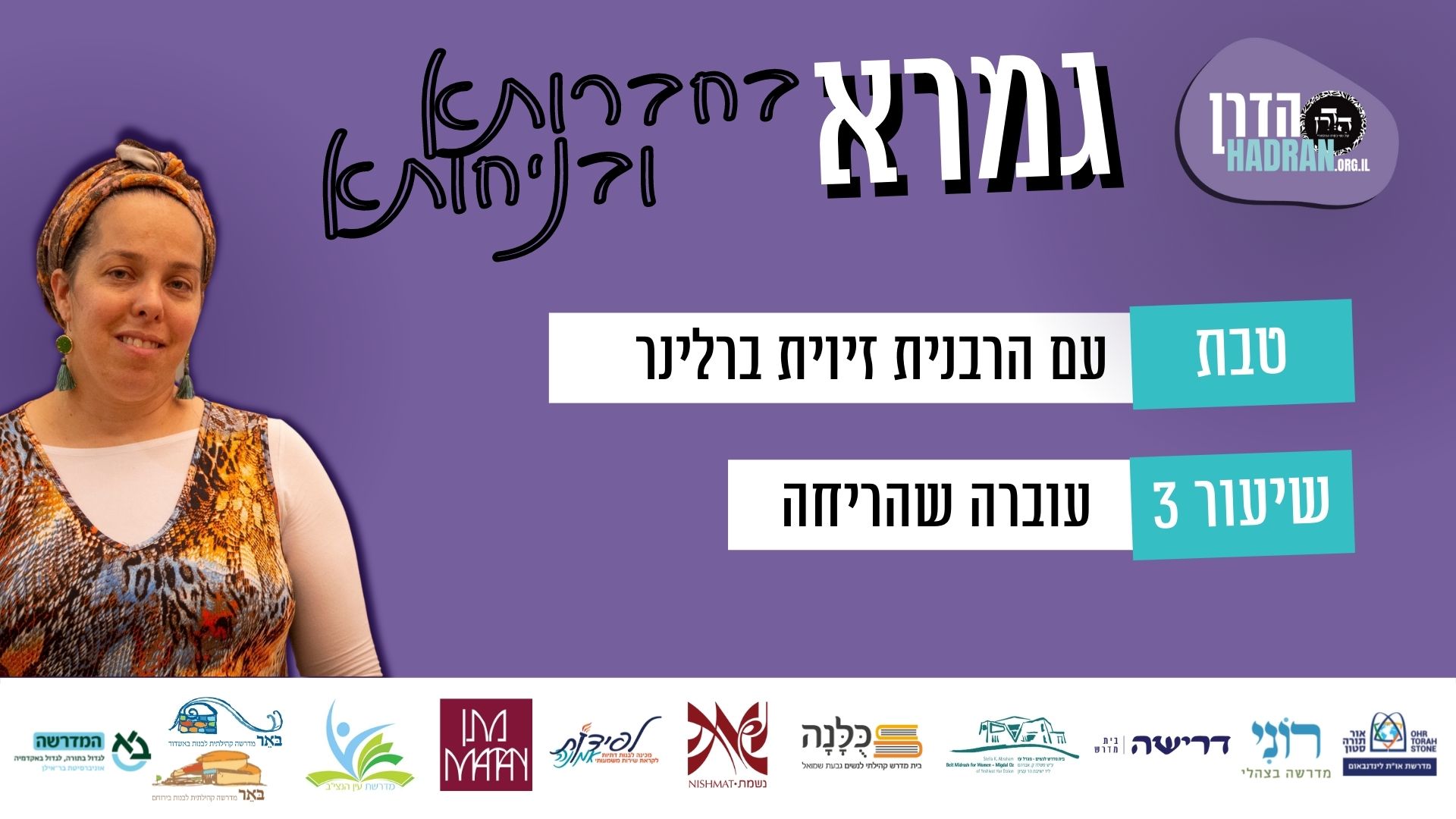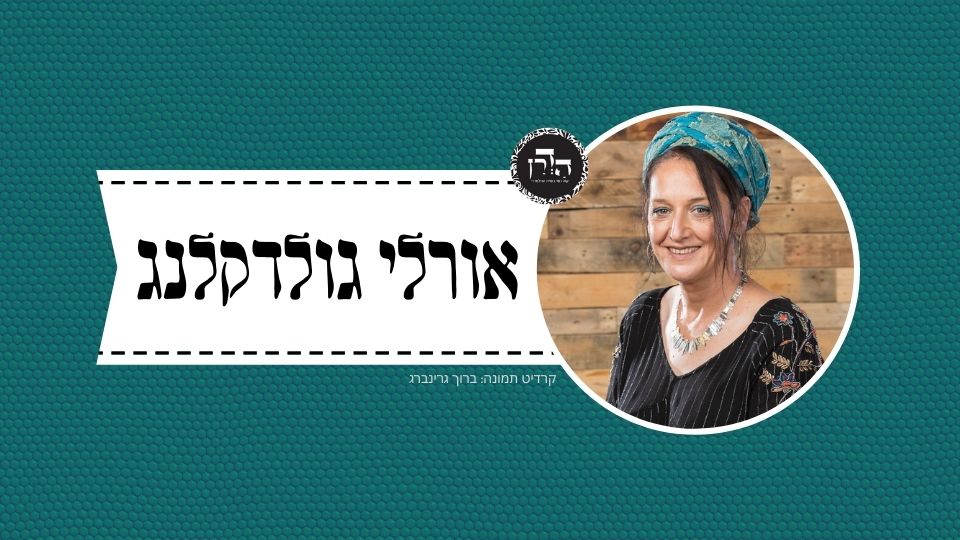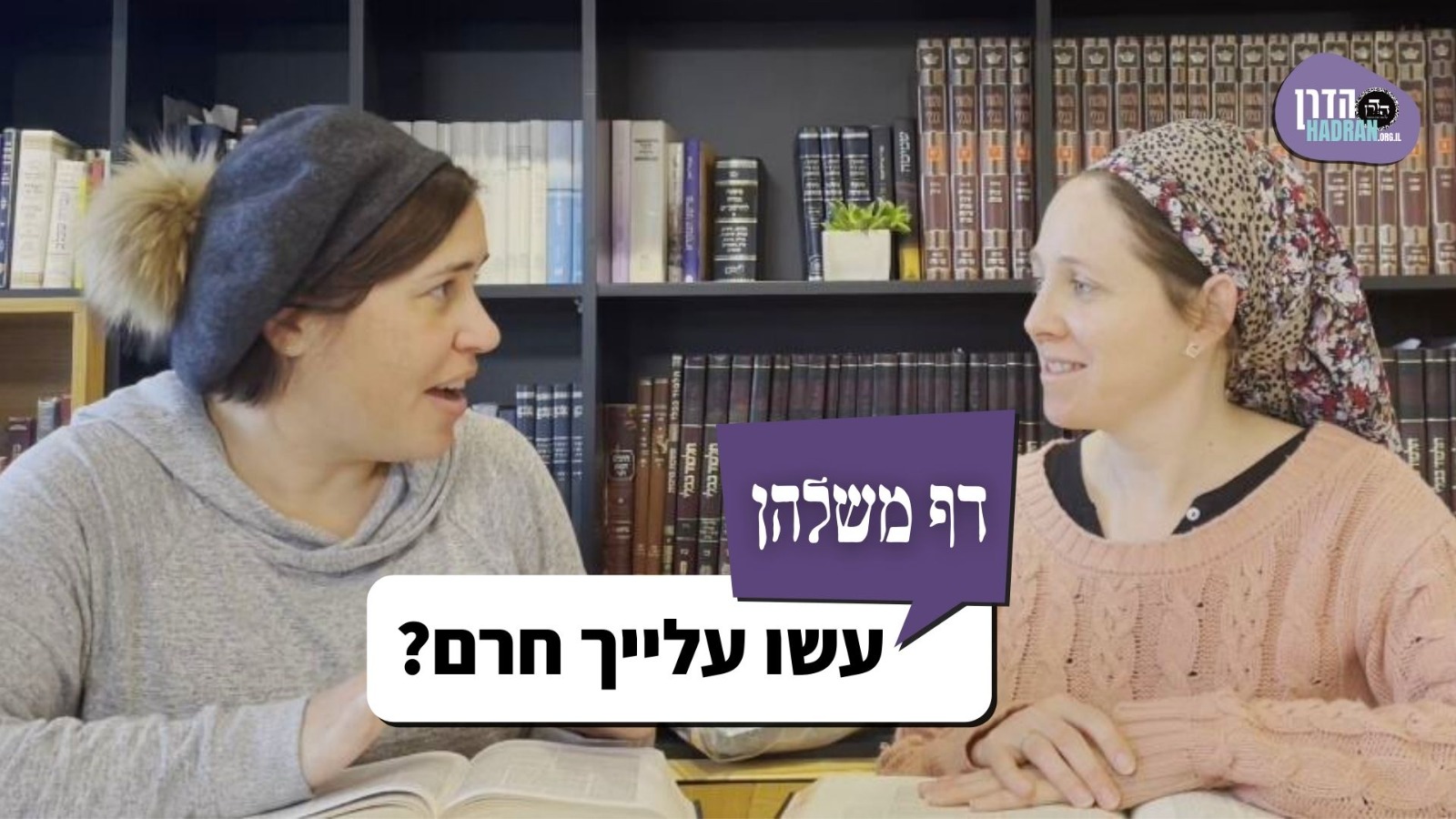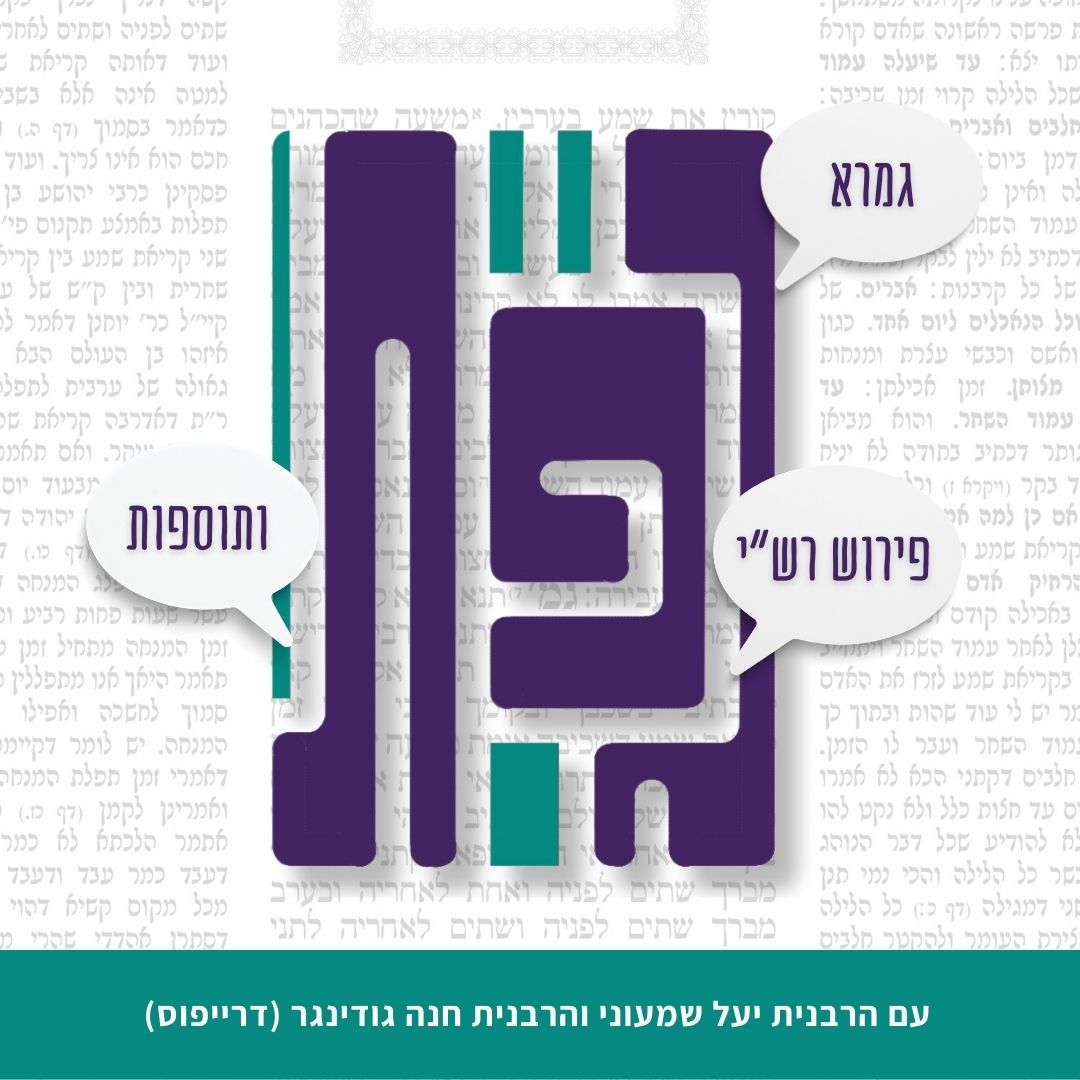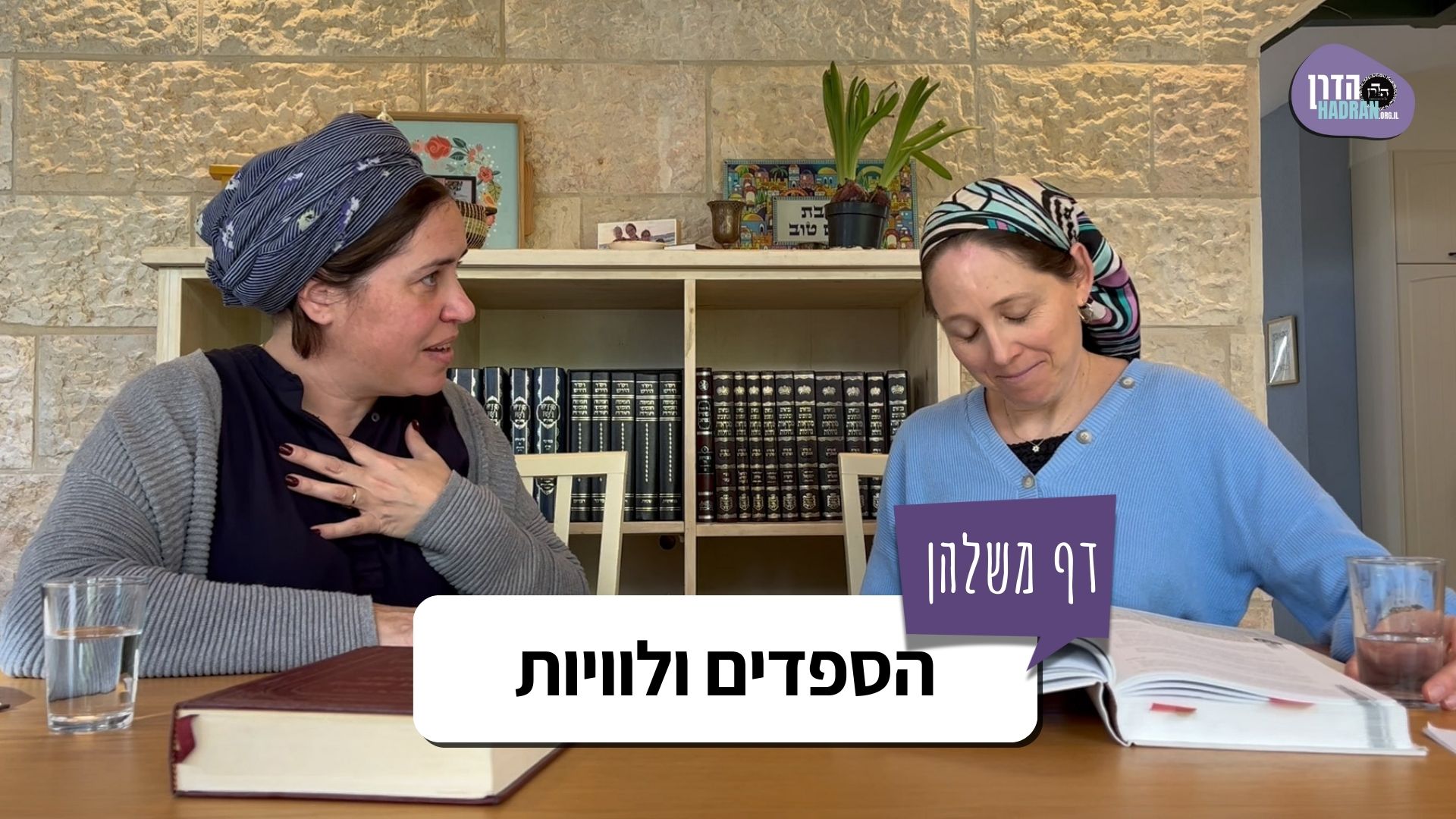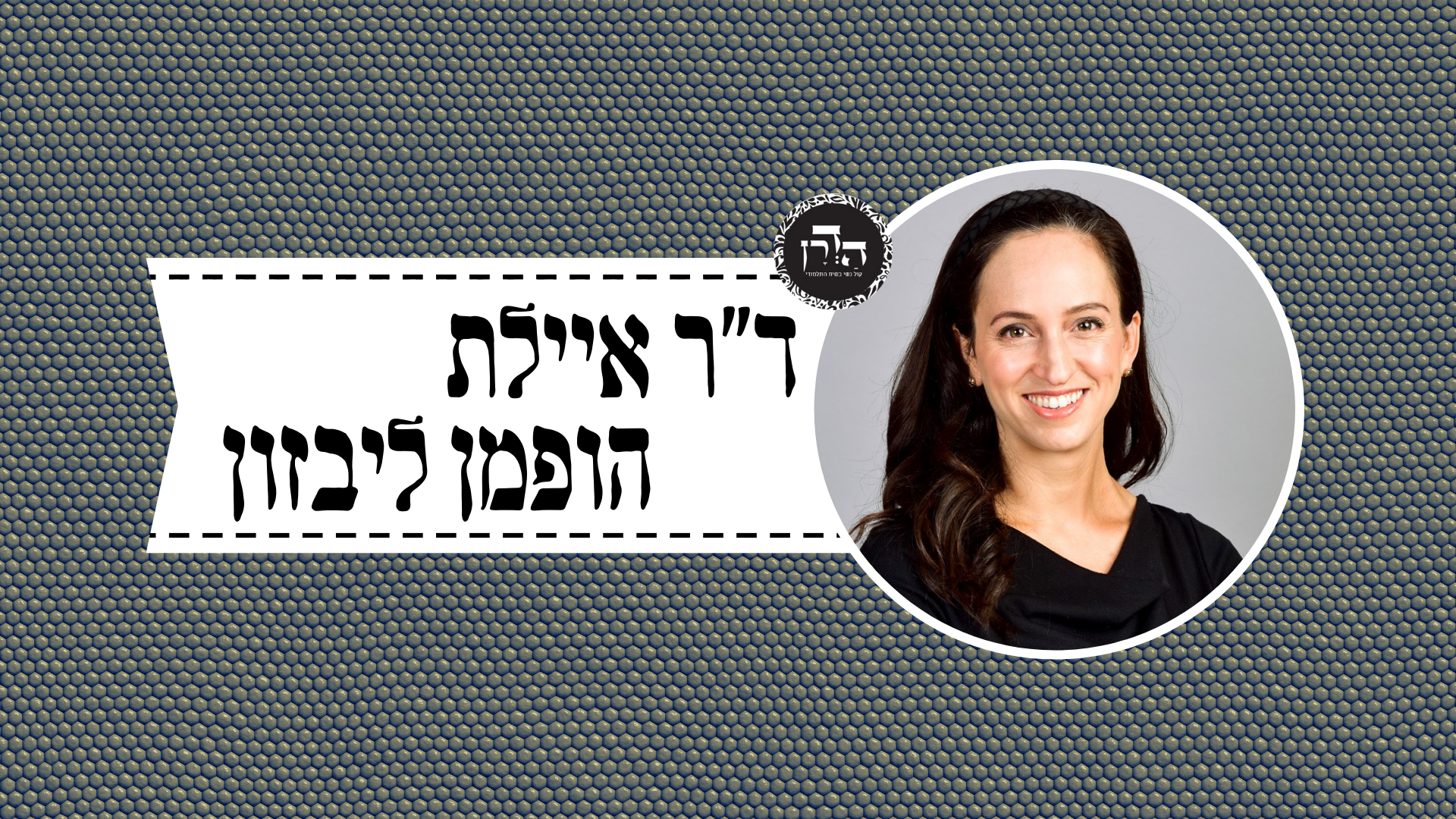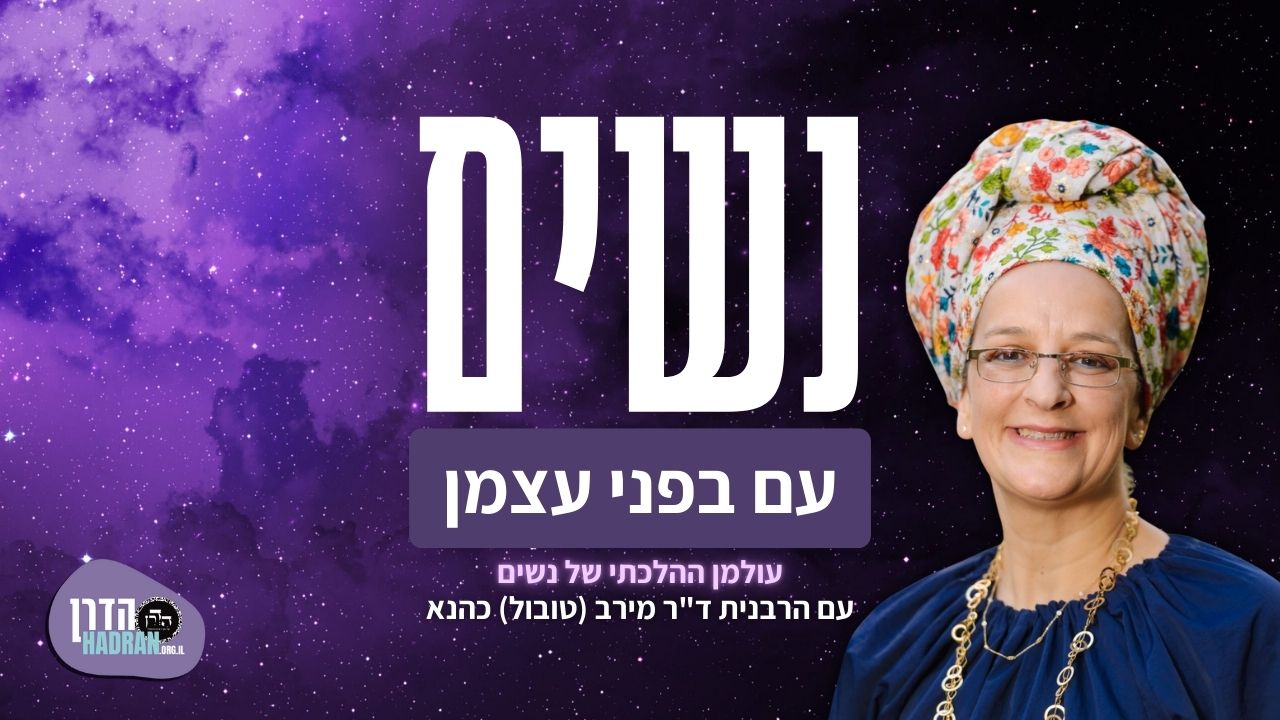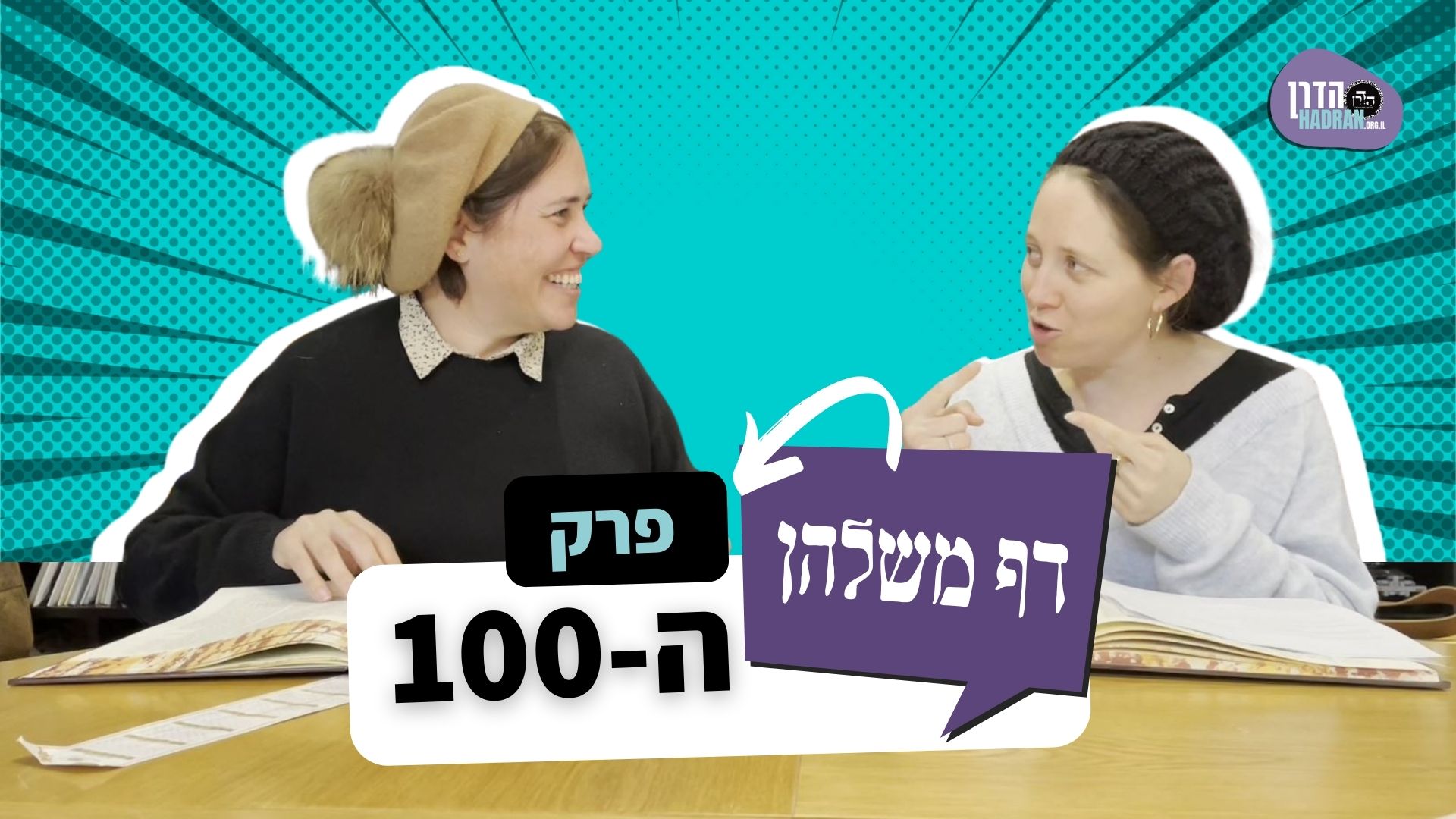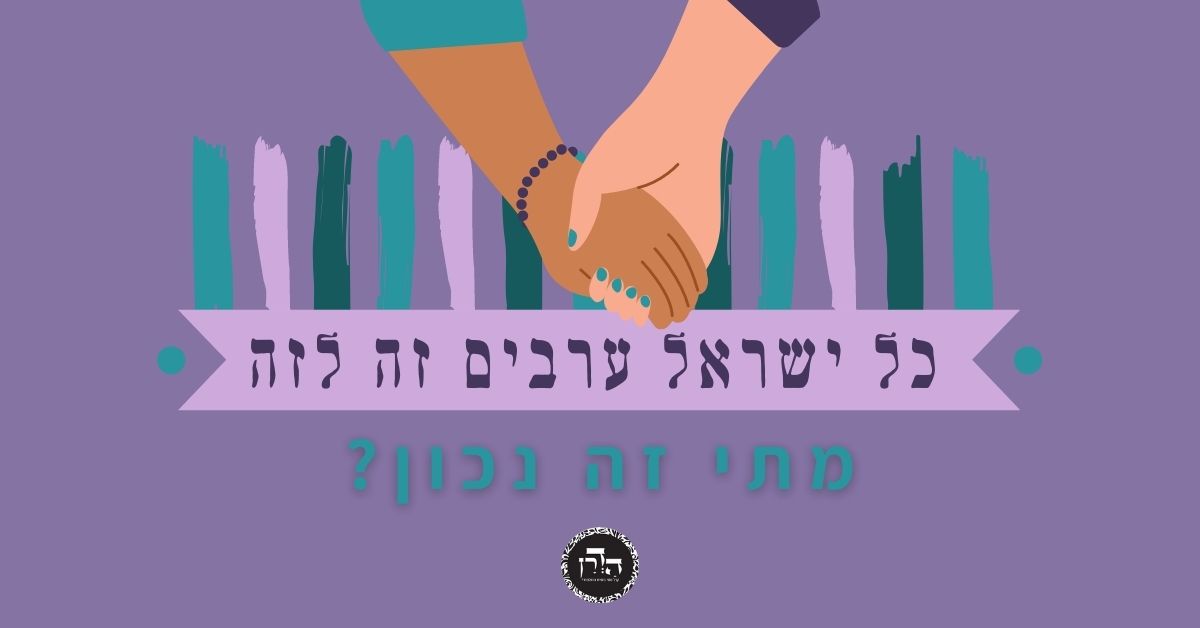הקדיש כל נכסיו והיה עליו לשלם כתובת אשתו. האם אנו צריכים להיות מודאגים שהוא רוצה להערים ולעשות קנוניא עם אשתו כדי להחזיר את הכספים מההקדש? כנ”ל לגבי ערב. המקדיש נכסיו וצריך לשלם כתובה, איך הוא עושה? האם מי שמקדיש נכסים עם שעבוד הקדשו תקף או לא? איך פודים? במה זה תלוי?
רוצה להקדיש שיעור?
כלים
העמקה
רוצה להבין מה באמת קורה מתחת לפני השטח של הסוגיה?
שיעורים, פודקאסטים והרחבות של מיטב המורות שלנו יפתחו לך עוד זוויות וכיווני חשיבה.
חדשה בלימוד הגמרא?
זה הדף הראשון שלך? איזו התרגשות עצומה! יש לנו בדיוק את התכנים והכלים שיעזרו לך לעשות את הצעדים הראשונים ללמידה בקצב וברמה שלך, כך תוכלי להרגיש בנוח גם בתוך הסוגיות המורכבות ומאתגרות.
פסיפס הלומדות שלנו
גלי את קהילת הלומדות שלנו, מגוון נשים, רקעים וסיפורים. כולן חלק מתנועה ומסע מרגש ועוצמתי.
ערכין כג
מַתְנִי׳ הַמַּקְדִּישׁ נְכָסָיו וְהָיְתָה עָלָיו כְּתוּבַּת אִשָּׁה, רַבִּי אֱלִיעֶזֶר אוֹמֵר: כְּשֶׁיְּגָרְשֶׁנָּה יִדּוֹר הֲנָאָה, רַבִּי יְהוֹשֻׁעַ אוֹמֵר: אֵינוֹ צָרִיךְ. כַּיּוֹצֵא בְּדָבָר אָמַר רַבָּן שִׁמְעוֹן בֶּן גַּמְלִיאֵל: אַף הֶעָרֵב לָאִשָּׁה בִּכְתוּבָּתָהּ וְהָיָה בַּעְלָהּ מְגָרְשָׁהּ יַדִּירֶנָּה הֲנָאָה, שֶׁמָּא יַעֲשֶׂה קִינוּנְיָא עַל נְכָסִים שֶׁל זֶה וְיַחְזִיר אֶת אִשְׁתּוֹ.
MISHNA: In the case of one who consecrates his property and there was the outstanding debt of the marriage contract of his wife, for whose repayment one’s property is liened, Rabbi Eliezer says: When he divorces her, he shall vow that benefit from her is forbidden to him. This is to prevent collusion, by which he divorces her, she collects payment from the consecrated property, and he then remarries her. Rabbi Yehoshua says: He need not do so. On a similar note, Rabban Shimon ben Gamliel said: Even in the case of the guarantor of a woman for her marriage contract, and her husband was divorcing her and could not pay the debt, the husband shall vow that benefit from her is forbidden to him, lest he and his wife engage in collusion [kinunya] and collect payment from the property of that guarantor, and then the husband will remarry his wife.
גְּמָ׳ בְּמַאי קָמִיפַּלְגִי? רַבִּי אֱלִיעֶזֶר סָבַר: אָדָם עוֹשֶׂה קִינוּנְיָא עַל הַהֶקְדֵּשׁ, וְרַבִּי יְהוֹשֻׁעַ סָבַר: אֵין אָדָם עוֹשֶׂה קִינוּנְיָא עַל הַהֶקְדֵּשׁ.
GEMARA: The mishna teaches that there is a dispute between Rabbi Eliezer and Rabbi Yehoshua with regard to a case where one consecrates his property and then divorces his wife. The Gemara asks: With regard to what principle do they disagree? The Gemara explains: Rabbi Eliezer holds that a person would engage in collusion against even the Temple treasury, and for this reason he divorces his wife. The required vow serves to prevent such a possibility. And Rabbi Yehoshua holds that a person would not engage in collusion against the Temple treasury.
וְאֶלָּא הָא דְּאָמַר רַב הוּנָא: שְׁכִיב מְרַע שֶׁהִקְדִּישׁ כׇּל נְכָסָיו, וְאָמַר: ״מָנֶה לִפְלוֹנִי בְּיָדִי״ — נֶאֱמָן, חֲזָקָה אֵין עוֹשֶׂה קִינוּנְיָא עַל הֶקְדֵּשׁ, לֵימָא כְּתַנָּאֵי אַמְרַהּ לִשְׁמַעְתֵּיהּ?
The Gemara asks: But if so, consider that which Rav Huna says: If a person on his deathbed consecrated all of his property and said: So-and-so has one hundred dinars that I owe him in my possession, his statement is deemed credible, as there is a presumption that a person does not engage in collusion against the Temple treasury. Let us say that Rav Huna stated this halakha with regard to a matter that is the subject of a dispute between tanna’im.
לָא, עַד כָּאן לָא פְּלִיגִי אֶלָּא בְּבָרִיא, אֲבָל בִּשְׁכִיב מְרַע — דִּבְרֵי הַכֹּל אֵין אָדָם עוֹשֶׂה קִינוּנְיָא עַל הַהֶקְדֵּשׁ. מַאי טַעְמָא? אֵין אָדָם חוֹטֵא וְלֹא לוֹ.
The Gemara responds: No, Rabbi Eliezer and Rabbi Yehoshua disagree whether or not one colludes against the Temple treasury only with regard to a healthy person. But with regard to a person on his deathbed, everyone agrees that such a person does not engage in collusion against the Temple treasury. What is the reason? Since he will soon die, he does not stand to gain anything from his statement, and a person sins only for his own benefit, not for the benefit of others.
אִיכָּא דְּאָמְרִי: בְּבָרִיא דְּכוּלֵּי עָלְמָא לָא פְּלִיגִי דְּאֵין אָדָם עוֹשֶׂה קִינוּנְיָא עַל הֶקְדֵּשׁ, וְהָכָא בְּנֶדֶר שֶׁהוּדַּר בְּרַבִּים קָמִיפַּלְגִי, מָר סָבַר: יֵשׁ לוֹ הֲפָרָה, וּמַר סָבַר: אֵין לוֹ הֲפָרָה.
Some say that in the case of a healthy person, everyone agrees on the question of whether or not a person would engage in collusion against the Temple treasury, i.e., they agree that one must be concerned that a person may engage in collusion. And here, they disagree with regard to a vow administered in public, e.g., a vow administered by the court. One Sage, Rabbi Yehoshua, holds that such a vow has the option of nullification. Consequently, there is no use in requiring the husband to take a vow even in public, as a halakhic authority can later dissolve it. And one Sage, Rabbi Eliezer, holds that such a vow does not have the option of nullification. Therefore, the court administers a vow in public to prevent collusion.
וְאִיבָּעֵית אֵימָא: דְּכוּלֵּי עָלְמָא נֶדֶר שֶׁהוּדַּר בָּרַבִּים יֵשׁ לוֹ הֲפָרָה, וְהָכָא בְּנֶדֶר שֶׁהוּדַּר עַל דַּעַת רַבִּים קָמִיפַּלְגִי.
And if you wish, say instead: Everyone agrees that a vow administered in public has the option of nullification. And here, they disagree with regard to a vow administered based on the consent of the public, i.e., when the court says to the husband: You are taking a vow that benefit from your wife is forbidden to you based on our consent. According to Rabbi Eliezer, there is no option of nullification for such a vow, and therefore it is effective in preventing collusion, whereas Rabbi Yehoshua maintains that even such a vow can be nullified and is therefore ineffective in preventing collusion.
וְאֶלָּא הָא דְּאָמַר אַמֵּימָר: נֶדֶר שֶׁהוּדַּר בָּרַבִּים יֵשׁ לוֹ הֲפָרָה, עַל דַּעַת רַבִּים אֵין לוֹ הֲפָרָה — לֵימָא כְּתַנָּאֵי אַמְרַהּ לִשְׁמַעְתֵּיהּ? וְתוּ, רַבִּי יְהוֹשֻׁעַ אוֹמֵר: ״אֵינוֹ צָרִיךְ״? ״אֵינוֹ מוֹעִיל״ מִיבְּעֵי לֵיהּ!
The Gemara asks: But if so, consider that which Ameimar says: A vow that was taken in public has the option of nullification; if it was taken based on the consent of the public it does not have the option of nullification. Let us say that Ameimar stated this halakha with regard to a matter that is the subject of a dispute between tanna’im. And furthermore, Rabbi Yehoshua says in the mishna that the husband need not take a vow. If his reason is that such a vow is ineffective, he should have stated: It is ineffective.
אֶלָּא הָכָא בִּשְׁאֵלָה דְּהֶקְדֵּשׁ קָמִיפַּלְגִי.
Rather, here they disagree with regard to one’s ability to request the dissolution of a vow involving consecrated property. Rabbi Eliezer holds that one may not request the dissolution of a vow involving consecrated property. Accordingly, there is a concern that the husband might collude with his wife by divorcing her in order to extract the consecrated property from the Temple treasury, as he has no other means of releasing the property. In contrast, Rabbi Yehoshua maintains that such a vow may be dissolved and therefore there is no reason for the husband to collude with his wife.
וְהָתַנְיָא: הַמַּקְדִּישׁ נְכָסָיו וְהָיְתָה עָלָיו כְּתוּבַּת אִשָּׁה, רַבִּי אֱלִיעֶזֶר אוֹמֵר: כְּשֶׁהוּא מְגָרְשָׁהּ יִדּוֹר הֲנָאָה, רַבִּי יְהוֹשֻׁעַ אוֹמֵר: אֵינוֹ צָרִיךְ, וְאָמַר רַבִּי אֶלְעָזָר בְּרַבִּי שִׁמְעוֹן: הֵן הֵן דִּבְרֵי בֵּית שַׁמַּאי, הֵן הֵן דִּבְרֵי בֵּית הִלֵּל.
The Gemara adds: And it is likewise taught in a baraita: In the case of one who consecrates his property and there was the outstanding debt of the marriage contract of his wife upon it, Rabbi Eliezer says: When he divorces her, he shall vow that benefit from her is forbidden to him, to prevent collusion. Rabbi Yehoshua says: He need not do so. And Rabbi Elazar, son of Rabbi Shimon, said: This statement of Rabbi Eliezer is the same as the statement of Beit Shammai, and this statement of Rabbi Yehoshua is the same as the statement of Beit Hillel.
שֶׁבֵּית שַׁמַּאי אוֹמְרִים: הֶקְדֵּשׁ טָעוּת הֶקְדֵּשׁ, וּבֵית הִלֵּל אוֹמְרִים: הֶקְדֵּשׁ טָעוּת אֵינוֹ הֶקְדֵּשׁ.
As Beit Shammai say: Consecration that one performed in error is effective as consecration. Consequently, one cannot request the dissolution of his consecration due to circumstances that unfolded on the grounds that he did not mean to make a vow. And Beit Hillel say: Consecration that one performed in error is not consecration, and one may therefore request the dissolution of his consecration.
וְכֵן הָיָה רַבָּן שִׁמְעוֹן בֶּן גַּמְלִיאֵל אוֹמֵר וְכוּ׳. מֹשֶׁה בַּר עַצְרִי עָרְבָא דְּכַלְּתֵיהּ הֲוָה, וְרַב הוּנָא בְּרֵיהּ צוּרְבָּא מֵרַבָּנַן הֲוָה, וּדְחִיקָא לֵיהּ מִילְּתָא. אָמַר אַבָּיֵי: לֵיכָּא דְּנַסְּבֵיהּ עֵצָה לְרַב הוּנָא, דְּלִיגָרֵשׁ לִדְבֵיתְהוּ וְתִיתְבַּע כְּתוּבְּתַהּ מֵאֲבוּהּ, וְלַהְדְּרַהּ מִיהֲדָרי.
§ The mishna teaches: On a similar note, Rabban Shimon ben Gamliel said that even in the case of a guarantor for a woman for her marriage contract, he vows that benefit from her is forbidden to him, lest he and his wife engage in collusion. The Gemara relates that Moshe bar Atzrei was the guarantor for the marriage contract of his daughter-in-law, and Rav Huna, his son, was a Torah scholar and was hard-pressed for money. Abaye said: Is there no one who will advise Rav Huna that he should divorce his wife, and she should claim her marriage contract from his father, the guarantor of the marriage contract, and that he should then return and remarry her, and in this manner they will obtain money?
אֲמַר לֵיהּ רָבָא: וְהָאֲנַן ״יִדּוֹר הֲנָאָה״ תְּנַן! וְאַבָּיֵי — אַטּוּ כֹּל דִּמְגָרֵשׁ בְּבֵי דִינָא מְגָרֵשׁ? לְסוֹף אִיגַּלַּאי מִלְּתָא דְּכֹהֵן הֲוָה. אָמַר אַבָּיֵי: בָּתַר עַנְיָא אָזְלָא עַנְיוּתָא.
Rava said to Abaye: But we learned in the mishna that in such a case he shall vow that benefit from her is forbidden to him. If so, Rav Huna cannot remarry her. And the Gemara explains that Abaye would argue: Is that to say that anyone who divorces, divorces in court? Let Rav Huna divorce his wife outside the court, so that he will not be forced to take a vow and he will therefore be allowed to remarry her. The Gemara relates that ultimately it was revealed that Rav Huna was a priest, which means that if he had divorced his wife he would have been prohibited from remarrying her. Abaye said of this revelation: This is an example of the saying that poverty follows the poor, i.e., it is difficult to remove a poor person from a state of poverty.
וּמִי אָמַר אַבָּיֵי הָכִי? וְהָאָמַר אַבָּיֵי: אֵיזֶהוּ רָשָׁע עָרוּם? זֶה הַמַּשִּׂיא עֵצָה לִמְכּוֹר בִּנְכָסִים, כְּרַבָּן גַּמְלִיאֵל.
The Gemara asks: And did Abaye actually say this? Doesn’t Abaye say: Who is a wily, wicked person? This is one who advises another to sell property that he received from someone who stipulated that the property should pass to a second beneficiary upon the death of the first. And this is in accordance with the ruling of Rabban Shimon ben Gamliel, who maintains that the sale is valid and the second beneficiary may not remove the property from the possession of the buyer. If Abaye considers this individual as wicked for advising one to act against the intentions of a benefactor, how could he suggest that Rav Huna should extract money from the guarantor in the above case?
בְּרֵיהּ שָׁאנֵי, וְצוּרְבָּא מֵרַבָּנַן שָׁאנֵי.
The Gemara answers: When one is a guarantor for his son it is different, as he would forgive his son for acting in this manner, as the son will in any case inherit his property. And furthermore, when this is performed for the benefit of a Torah scholar it is different, as it is proper to assist him so that he may continue studying Torah.
וְתִיפּוֹק לֵיהּ דְּעָרֵב דִּכְתוּבָּה לָא מִשְׁתַּעְבַּד!
The Gemara objects: And let Abaye deduce that such a course of action is ineffective, as a guarantor of a marriage contract is not legally responsible to pay the marriage contract.
קַבְּלָן הֲוָה. הָנִיחָא לְמַאן דְּאָמַר: קַבְּלָן, אַף עַל גַּב דְּלֵית לֵיהּ נְכָסִים לְלֹוֶה — מִשְׁתַּעְבַּד, אֶלָּא לְמַאן דְּאָמַר: אִית לֵיהּ — מִשְׁתַּעְבַּד, לֵית לֵיהּ — לָא מִשְׁתַּעְבַּד, מַאי אִיכָּא לְמֵימַר?
The Gemara responds: Moshe bar Atzrei was a guarantor who accepted unconditional responsibility [kablan] for the payment of the marriage contract. The Gemara objects: This works out well according to the one who says that with regard to a kablan, even though the debtor has no property at the time of the loan, nevertheless the kablan is responsible for payment. But according to the one who says that if the debtor has property then the kablan is responsible, but if he does not have property then the kablan does not agree to become responsible for the payment, what can be said? Since Rav Huna owned no property, how could payment of the marriage contract be collected from Moshe bar Atzrei?
אִיבָּעֵית אֵימָא: רַב הוּנָא הֲוָה לֵיהּ וְאִישְׁתְּדוּף, וְאִיבָּעֵית אֵימָא: אַבָּא לְגַבֵּיהּ בְּרֵיהּ שַׁעְבּוֹדֵי מְשַׁעְבֵּד נַפְשֵׁיהּ.
The Gemara responds: If you wish, say that Rav Huna had property at the time that his father accepted upon himself to be a guarantor, and it became blighted. And if you wish, say instead that a father, with regard to his son, accepts responsibility upon himself even if his son owns no property.
דְּאִיתְּמַר: עָרֵב דִּכְתוּבָּה — דִּבְרֵי הַכֹּל לָא מִשְׁתַּעְבַּד, קַבְּלָן דְּבַעַל חוֹב — דִּבְרֵי הַכֹּל מִשְׁתַּעְבַּד, עָרֵב דְּבַעַל חוֹב וְקַבְּלָן דִּכְתוּבָּה — פְּלִיגִי. אִיכָּא לְמַאן דְּאָמַר: אִית לֵיהּ נִכְסֵי לְלֹוֶה — מִשְׁתַּעְבַּד, לֵית לֵיהּ — לָא מִשְׁתַּעְבַּד, וְאִיכָּא לְמַאן דְּאָמַר: אַף עַל גַּב דְּלֵית לֵיהּ — מִשְׁתַּעְבַּד.
The Gemara cites the aforementioned dispute in detail. As it was stated: Everyone agrees that an ordinary guarantor of a marriage contract does not resolve to become responsible for paying the marriage contract. Everyone also agrees that a kablan for a creditor is responsible for paying the debtor’s debt. By contrast, with regard to an ordinary guarantor of a debt owed to a creditor and a kablan for the payment of a marriage contract, the Sages disagree. There is one Sage who says: If the debtor or the husband has property then the guarantor becomes responsible, but if he does not have property then he does not become responsible. And there is another Sage who says: Even though the debtor or the husband does not have property, the guarantor becomes responsible for payment of the obligation.
וְהִלְכְתָא בְּכוּלְּהוּ, אַף עַל גַּב דְּלֵית לֵיהּ נָמֵי מִשְׁתַּעְבַּד, לְבַר מֵעָרֵב דִּכְתוּבָּה, דְּאַף עַל גַּב דְּאִית לֵיהּ לָא מִשְׁתַּעְבַּד. מַאי טַעְמָא? מִצְוָה קָעָבֵיד, וְלָא מִידֵּי חַסְּרֵיהּ.
And the halakha in all of these cases is: Even though the principal does not have property of his own, the guarantor still becomes responsible for paying the obligation, except for the case of an ordinary guarantor of a marriage contract, with regard to which, even though the husband has property of his own when he draws up the marriage contract, the guarantor does not resolve to become responsible. What is the reason? He performs a mitzva, i.e., he agrees to be a guarantor only so that the woman will consent to the marriage but he does not actually resolve to become responsible. And furthermore, the woman did not lose anything in exchange for which the guarantor would have accepted responsibility, as the husband did not borrow money from her.
הָהוּא גַּבְרָא דְּזַבְּנִינְהוּ לְנִכְסֵיהּ, וְקָא (גרשה) [מְגָרְשַׁהּ] לִדְבֵיתְהוּ. שַׁלְחַהּ רַב יוֹסֵף בְּרֵיהּ דְּרָבָא לְקַמֵּיהּ דְּרַב פָּפָּא: עָרֵב תְּנַן, הֶקְדֵּשׁ תְּנַן, לוֹקֵחַ מַהוּ? אֲמַר לֵיהּ: תַּנָּא כִּי רוֹכְלָא נִיחַשֵּׁיב וְנֵיזִיל?
§ The Gemara relates that there was a certain man who sold his property and later when he divorced his wife he had no property with which to pay the marriage contract. The wife therefore sought to collect payment from the buyers. Rav Yosef, son of Rava, sent the case before Rav Pappa: When a wife’s marriage contract is paid by a guarantor, we learned in the mishna that the husband vows that benefit from her is forbidden to him. Similarly, when she collects her marriage contract from consecrated property, we learned in the mishna that the husband takes such a vow. What is the halakha when she collects payment from a buyer? Rav Pappa said to him: Should the tanna have continued reckoning cases like a peddler, who announces all his wares? Obviously, the halakha is the same in the case of a buyer, as the identical reasoning applies despite the fact that the tanna neglected to mention this case.
נְהַרְדָּעֵי אָמְרִי: דִּתְנַן תְּנַן, דְּלָא תְּנַן לָא תְּנַן. אָמַר רַב מְשַׁרְשְׁיָא: מַאי טַעְמָא דִּנְהַרְדָּעֵי? בִּשְׁלָמָא הֶקְדֵּשׁ — מִשּׁוּם רֶיוַח דְּהֶקְדֵּשׁ, עָרֵב נָמֵי — מִצְוָה הוּא דַּעֲבַד, וְלָאו מִידֵּי חַסְּרֵיהּ.
The Sages of Neharde’a say: That which we learned in the mishna we learned, and that which we did not learn in the mishna we did not learn, i.e., the husband does not need to make the vow when the payment of the marriage contract is collected from buyers. Rav Mesharshiyya said: What is the reasoning of the Sages of Neharde’a? Granted, when the payment of the marriage contract is collected from consecrated property the husband must make the vow due to the importance of maintaining the profit of the Temple treasury. In the case of a guarantor as well, the husband must make the vow, as the guarantor performed a mitzva and the woman did not lose anything, i.e., the guarantor received nothing from the wife, and he nevertheless accepted responsibility for the payment of the marriage contract. The husband therefore vows in order that others should not be discouraged from performing this mitzva.
אֶלָּא לוֹקֵחַ, מִכְּדֵי מִידָּע יָדַע דְּכֹל חַד וְחַד אִיכָּא עֲלֵיהּ כְּתוּבָּה, אַמַּאי נֵיזִיל וְנִיזְבּוֹן? אִיהוּ הוּא דְּאַפְסֵיד אַנַּפְשֵׁיהּ!
But in the case of a buyer, since he knows that each and every married man has upon him the potential obligation to pay a marriage contract, why should he go and purchase a field from the husband when there is a lien on it due to the marriage contract? Since it is he who caused himself to lose out, it is unreasonable to prevent the husband from remarrying his wife merely for the benefit of the buyer.
מַתְנִי׳ הַמַּקְדִּישׁ נְכָסָיו, וְהָיְתָה עָלָיו כְּתוּבַּת אִשָּׁה וּבַעַל חוֹב — אֵין הָאִשָּׁה יְכוֹלָה לִגְבּוֹת כְּתוּבָּתָהּ מִן הַהֶקְדֵּשׁ, וְלֹא בַּעַל חוֹב אֶת חוֹבוֹ, אֶלָּא הַפּוֹדֶה פּוֹדֶה עַל מְנָת לִיתֵּן לְאִשָּׁה בִּכְתוּבָּתָהּ וּלְבַעַל חוֹב אֶת חוֹבוֹ. הִקְדִּישׁ תִּשְׁעִים מָנֶה וְהָיָה חוֹבוֹ מֵאָה מָנֶה — מוֹסִיף עוֹד דִּינָר, וּפוֹדֶה אֶת הַנְּכָסִים הָאֵלּוּ עַל מְנָת לִיתֵּן לָאִשָּׁה כְּתוּבָּתָהּ וּלְבַעַל חוֹב אֶת חוֹבוֹ.
MISHNA: In the case of one who consecrates his property and there was an outstanding debt of the marriage contract of his wife and of a creditor, the woman may not collect the payment of her marriage contract from the Temple treasury, nor may the creditor collect his debt. Rather, the one who redeems the property redeems it for a cheap price in order to give the woman her marriage contract payment and the creditor his debt. For example, if one consecrated property worth nine thousand dinars and his debt was ten thousand dinars, leaving no property for redemption, the creditor lends an additional dinar to the debtor and the debtor redeems the property with that dinar, in order to give the woman her marriage contract payment and the creditor his debt.
גְּמָ׳ לְמָה לִי לְמֵימַר ״הַפּוֹדֶה פּוֹדֶה״? מִשּׁוּם דְּרַבִּי אֲבָהוּ, דְּאָמַר רַבִּי אֲבָהוּ: שֶׁלֹּא יֹאמְרוּ הֶקְדֵּשׁ יוֹצֵא בְּלֹא פִּדְיוֹן.
GEMARA: The Gemara asks: Why do I need the mishna to state that the one who redeems, redeems, i.e., why isn’t the property given directly to the creditor without redemption? The Gemara answers: This is due to the explanation of Rabbi Abbahu, as Rabbi Abbahu says: The property is redeemed so that people will not say that consecrated property exits to non-sacred status without redemption.
מַתְנִיתִין דְּלָא כְּרַבָּן שִׁמְעוֹן בֶּן גַּמְלִיאֵל, דְּתַנְיָא: רַבָּן שִׁמְעוֹן בֶּן גַּמְלִיאֵל אוֹמֵר: אִם הָיָה חוֹבוֹ כְּנֶגֶד הֶקְדֵּשׁוֹ — פּוֹדֶה,
The mishna teaches that if one consecrated property worth nine thousand dinars and his debt was ten thousand dinars, the creditor lends an additional dinar to the debtor for him to redeem the property. The Gemara notes: The mishna is not in accordance with the opinion of Rabban Shimon ben Gamliel, as it is taught in a baraita that Rabban Shimon ben Gamliel says: If his debt corresponded to the value of his consecrated property, then the debtor redeems the property in the manner prescribed in the mishna.
וְאִם לָאו — אֵינוֹ פּוֹדֶה. וְרַבָּנַן, עַד כַּמָּה? אָמַר רַב הוּנָא בַּר יְהוּדָה אָמַר רַב שֵׁשֶׁת: עַד פַּלְגָא.
But if the value of the consecrated property is not enough to cover the debt, he does not redeem the property in this manner. Instead, it must be redeemed in accordance with its value. The Gemara asks: And according to the Rabbis, up to what amount may the property be redeemed in the manner described in the mishna? Rav Huna bar Yehuda says that Rav Sheshet says: The consecrated property must be worth at least half of the debt. If the property is worth less, it may be redeemed only in accordance with its monetary value.
מַתְנִי׳ אַף עַל פִּי שֶׁאָמְרוּ חַיָּיבֵי עֲרָכִין מְמַשְׁכְּנִין (אוֹתוֹ) [אוֹתָן], נוֹתְנִין לוֹ מְזוֹן שְׁלֹשִׁים יוֹם, וּכְסוּת שְׁנֵים עָשָׂר חֹדֶשׁ, מִטָּה מוּצַּעַת, וְסַנְדָּלָיו, וּתְפִלָּיו — לוֹ, אֲבָל לֹא לְאִשְׁתּוֹ וּלְבָנָיו.
MISHNA: Although the Sages said (21a): With regard to those obligated to pay valuations, the court repossesses their property to pay their debt to the Temple treasury; nevertheless, the treasurer gives him permission to keep food sufficient for thirty days, and garments sufficient for twelve months, and a bed made with linens, and his sandals, and his phylacteries. The treasurer leaves these items for him, but he does not leave items for his wife or for his children.
אִם הָיָה אוּמָּן — נוֹתֵן לוֹ שְׁנֵי כְּלֵי אוּמָּנוּת מִכׇּל מִין וּמִין, חָרָשׁ — נוֹתְנִין לוֹ שְׁנֵי מַעֲצָדִין וּשְׁנֵי מְגֵירוֹת. רַבִּי אֱלִיעֶזֶר אוֹמֵר: אִם הָיָה אִיכָּר — נוֹתֵן לוֹ צִמְדּוֹ, חַמָּר — נוֹתֵן לוֹ חֲמוֹרוֹ.
If the one obligated to pay was a craftsman, the treasurer gives him permission to keep two tools of his craft of each and every type, e.g., for a carpenter, the treasurer gives him permission to keep two adzes [matzadin] and two saws. Rabbi Eliezer says: If he was a farmer, the treasurer gives him permission to keep his pair of oxen with which he plows the field. If he was a donkey driver, the treasurer gives him permission to keep his donkey.
הָיָה לוֹ מִין אֶחָד מְרוּבֶּה וּמִין אֶחָד מוּעָט — אֵין אוֹמֵר לִמְכּוֹר אֶת הַמְרוּבֶּה וְלִיקַּח מִן הַמּוּעָט, אֶלָּא נוֹתְנִין לוֹ שְׁנֵי מִינִין מִן הַמְרוּבֶּה וְכֹל שֶׁיֵּשׁ לוֹ מִן הַמּוּעָט. הַמַּקְדִּישׁ נְכָסָיו — מַעֲלִין לוֹ תְּפִילָּיו.
If one had many tools of one type and few tools of one other type, e.g., three adzes and one saw, he may not say to the treasurer to sell one tool of the type of which he has many and to purchase for him one tool of the type of which he has few. Rather, the treasurer gives him two tools of the type of which he has many and he retains whatever he has of the type of which he has few. In contrast to one whose property is repossessed to pay valuations, from one who consecrates all his property, the treasurer takes his phylacteries, as they are included in the category of all his property.
גְּמָ׳ מַאי טַעְמָא? דְּאָמַר קְרָא:
GEMARA: The Gemara asks: What is the reason that the treasurer leaves him with all of the tools mentioned in the mishna? The Gemara explains that the reason is that the verse states:

